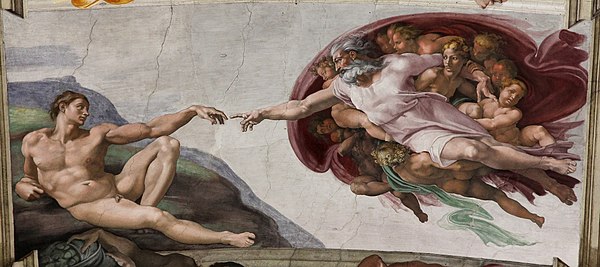
The original question that spawned my recent thoughts on afterlife was this: "If there is no life after this one, then what we do here matters more than ever." This was on Victor Reppert's blog [1] One answer comes from an atheist friend,Hugo Pelland, "However, if we take a kind of 'mathematical' approach combined with one of the Christian version of salvation, then our lives are completely meaningless as it's just about accepting Jesus as Lord and Savior. Nothing else matters, and our lives are infinitely short compared to the infinitely long afterlives." In all fairness it is important to point out this is 'Jesus is my savior and will forgive everything so nothing else matters', thankfully." He goes on: "I clarified, it was just an hypothetical example, one nobody follows that way .... The point is to illustrate that views regarding the ides behind the original post can be stretched in any directions." [2] So logically our belief implies this but no one lives that way, got it.
In Hugo's description of Christian belief "the Christian version of salvation, then our lives are completely meaningless as it's just about accepting Jesus as Lord and Savior. Nothing else matters,..a' that is how he describes the belief even if he thinks no one lives up to it.I think the assumption behind that statement is that accepting Jesus is both the beginning and the end of Christian life. So that there is nothing beyond accepting. That is fallacious. Accepting Jesus is not the end neither chronologically nor teleologically. it's the beginning only in either sense,The end technically (there is no chronological end) is to know God. That is not merely acceptance but entails what we do after accepting. It involves a lot of things, an unending reality. I discussed knowing God last time. Today I will discuss what kind of valuation does the belief in afterlife place upon this life.
Eternal life is infinite and material life is only for the moment, but that doesn't mean we really place no value on the here and now. In fact the opposite is true.What we do with our lives and our hearts predicates our situation in eternity and thus this life has theological significance. In traditional terms the choice is between pleasure or torment predicated upon obedience to God. I don't believe those are the real choices.But the real choice is eternal life verses ceasing to exist. That is predicated upon knowing or seeking God. That is because I don't believe that hell is eternal conscious torment, i will discuss this at another time.
What does it mean to say this life has theological significance? It means that here and now matters in the theological scheme of things, not only because it determines our eternal destiny but also because we are here now and we can only live here and now even with a view to the future, This life is not diminished by belief in after life. What we do with our time in terms of the choices we make determines the outcome, not to form a works standpoint but in terns of receiving the grace of God, and choosing to seek God..
I'm not trying to best Hugo but he does help move the topic,His answer to me was:
Joe, of course your version is the best ;)And the fact that you say in your next comment that you "disagree that belief in after life means degrading this life. At least shouldn't and doesn't have to." goes to support it.
However, you have to admit that a blissful afterlife, conditional on how we behave in this one, necessarily means that the 'how' we behave matters more than the general well being of all humans. It's the same as me, as an Atheist, admitting that if there's no afterlife, there's no punishment for horrible crimes committed by people who don't get caught.
Is salvation in Christian theology predicated upon our behavior in this life? Only in the sense that acceptance of Christ is part of behavior. Not in the sense of earning reward or punishment, We don't earn salvation through good works "For it is by grace you have been saved, through faith--and this is not from yourselves, it is the gift of God--" (Eph 2:8)
10 For all who rely on the works of the law are under a curse, as it is written: “Cursed is everyone who does not continue to do everything written in the Book of the Law.”[e] 11 Clearly no one who relies on the law is justified before God, because “the righteous will live by faith.”[f] 12 The law is not based on faith; on the contrary, it says, “The person who does these things will live by them.”[g] 13 Christ redeemed us from the curse of the law by becoming a curse for us, for it is written: “Cursed is everyone who is hung on a pole.”[h] 14 He redeemed us in order that the blessing given to Abraham might come to the Gentiles through Christ Jesus, so that by faith we might receive the promise of the Spirit.(Gal 3)[3]
What would this life be without theological significance? The atheist will assume it doesn't matter since life is here and now we can only live in the here and now with no theological significance that only matters if there is something more which they don't believe in. One can only ask this question if one has a concept of what it means to have theological significance, Having never known Joy and meaning who knows what it matters not to have joy and meaning?
We are dealing with different orders of meaning, here I am comparing a wide veg verity of concepts under the label "belief." They don't necessarily have to mean God in the conventional sense, This vs. no belief, just "me" and stark reality with no wider meaning than my own interest due to my own consciousness, I'm alive ,I'm here, whatever I come across is meaningful to me in someway given what I make of it.. Belief offers meaning on a broader and more complex and more lasting level. Ask yourself given the things I find meaningful would they they be meaningful had I never existed? If the world actually had a larger run than it's beginning on June 20th 1956, and it's end the moment I cease to be, would it alter as meaningful had I never been born? With belief in God we can say yes, Without belief the best we can say is maybe someone would find it so in his or her own way whatever that means.
That reality does not make what happens in this life less important it makes it more important because it matters in a theological sense, it matters on a larger scale, for all time, It is meaningless to pit one aspect of life off against another and make as though one phase matters more than another. We are here now we can know God here and now. Here and now predicates eternity, We can live now and look to future nurtured by the past,
Come back to the point where Hugo says: "However, you have to admit that a blissful afterlife, conditional on how we behave in this one, necessarily means that the 'how' we behave matters more than the general well being of all humans. " But since life has theological significance securing the well being of all people, in so far as it is an expression of God's love is of great importance in the the here and now for theological reasons. Expression of God;s love alienable our own love and expressing itself in acts of compassion and social justice is part of knowing God.It;s an avenue to know God more.
[1] Victor Reppert, "If there is no life after this one, then what we do here matters more than ever." Dangerous Idea Blog, (November 20, 2018)
[2] Hugo Pelland Comment Section, "If there is no life after this one, then what we do here matters more than ever." Dangerous Idea Blog, (November 20, 2018)
[3] Bible Gateway, Galatians 3:10-14, New International Version,



